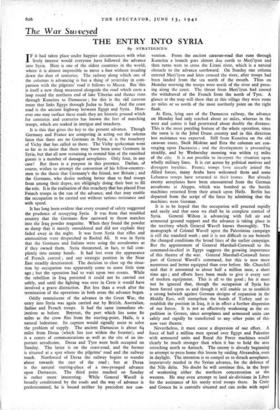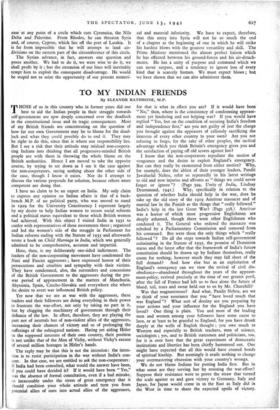The War Suiveyed THE ENTRY INTO SYRIA
By STRATEGICUS
IF it had taken place under happier circumstances with what 1 lively interest would everyone have followed the advance into Syria. Here is one of the oldest countries in the world, where it is almost impossible to move a foot without treading down the dust of centuries. The railway along which one of the columns is advancing is but a thing of yesterday in com- parison with the pilgrims' road it follows to Mecca. But this is itself a new thing measured alongside the road which casts a loop round the northern end of lake Tiberias and thence runs through Kuneitra to Damascus ; for this is the old caravan route that links Egypt through Judea to Syria. And the coast road is the ancient highway between Egypt and Syria. How- ever one may surface these roads they are historic ground which for centuries and centuries has known the feet of marching troops, which are soaked in intrigue and treachery.
It is this that gives the key to the present advance. Though Germany and France are competing in acting out the solemn farce that there are no Germans in Syria, it is the treachery of Vichy that has called us there. The Vichy spokesman went so far as to insist that there may have been some Germans in Syria, but that all now remaining to remind him of the vanished guests is a number of damaged aeroplanes. Only four, in any case! But there is a purpose in this pretence. Darlan, of course, wishes to attempt the conversion of his fellow-country- men to the thesis that Germany's the friend, not Britain ; and the Germans, who desire nothing better than to find troops from among their dupes, are obligingly doing their best to fill the role. It is the realisation of this treachery that has placed Free French troops in the van of the advance, and that may enable the occupation to be carried out without serious resistance and with speed.
It has long been evident that every counsel of safety suggested the prudence of occupying Syria. It was from that troubled country that the Germans flew eastward to throw matches into the Iraq powder magazine. When they found the powder so damp that it merely smouldered and did not explode they faded away in the night. It was from Syria that rifles and ammunition were despatched to Rashid Ali. It was in Syria that the Germans and Italians were using the aerodromes as if they owned them. Syria threatened, in fact, to fall com- pletely into enemy hands. It had lost even the appearance of French control ; and our strategic position in the Near East steadily deteriorated. The decision to clear up the situa- tion by occupation was apparently come to some little time ago ; but the operation had to wait upon two events. While the rebellion in Iraq persisted it could not be carried out safely, and until the fighting was over in Crete it would have involved a grave distraction. But less than a week after the termination of the operations in both areas the advance began.
Oddly reminiscent of the advance in the Great War, the entry into Syria was again carried out by British, Australian, Indian and French troops. It had the same immediate ob- jectives as before. Beyrout, the port which lies some 8o miles as the crow flies from the starting-point, Haifa, is a natural lodestone. Its capture would signally assist to solve the problem of supply. The ancient Damascus is about 64 miles from Deraa (which lies just within the frontier), and is a centre of communications as well as the site of an im- portant aerodrome. Deraa and Tyre were both occupied on Sunday. The latter is on the coast-road, and the former is situated at a spot where the pilgrims' road and the railway touch. Northward of Deraa the railway begins to wander about towards the east of the road ; but at Deraa is the natural starting-place of a two-pronged advance upon Damascus. The third point reached on Sunday is rather more interesting. While General Wavell is broadly conditioned by the roads and the way of advance is predetermined, he is bound neither by precedent nor con- vention. From the ancient caravan-road that runs through Kuneitra a branch goes almost due north to Merj'iyun and then turns west to cross the Litani river, which is a natural obstacle to the advance northward. On Sunday one column entered Merj'iyun and later crossed the river, after troops had been landed from the sea north of the mouth. Thus on Monday morning the troops were north of the river and press- ing along the coast. The threat from Merj'iyun had caused the withdrawal of the French from the north of Tyre. A glance at the map will show that at this village they were some 20 miles or so north of the most northerly point on the right flank.
At Ezra, lying east of the Damascus railway, the advance on Monday had only reached about zo miles, whereas in the west and centre it had penetrated about double the distance. This is the most puzzling feature of the whole operation, since the town is in the Jebel Druse country and in this direction less resistance was expected. Still from Kuneitra on the old caravan route, Skeik Miskine and Esra the columns are con- verging upon Damascus ; and the development is proceeding steadily, and by Wednesday morning was within 15 miles of the city. It is not possible to interpret the situation upon wholly military lines. It is cut across by political motives and divergent loyalties. French troops have already joined the Allied forces, many Arabs have welcomed them and some Lebanese troops have returned to their homes. But already enemy aeroplanes have been encountered from the German aerodrome at Aleppo, which was bombed as the hostile machines returned from their attack upon Haifa. Berlin has departed from the script of the farce by admitting that the machines were German.
It is to be hoped that the occupation will proceed rapidly and easily and that soon we shall be in complete control of Syria. General Wilson is advancing with full air and armoured ground support and the advance is taking place in the territory which General Wavell knows thoroughly. The monograph of Colonel Wavell upon the Palestinian campaign is still the standard work ; and it is not difficult to see beneath the changed conditions the broad lines of the earlier campaign. But the appointment of General Marshall-Cornwall to the command-in-chief in Egypt suggests the. growing importance of this theatre of the war. General Marshall-Cornwall forms part of General Wavell's command, but this is now more numerous and better equipped than ever before. Mr. Churchill said that it amounted to about half a million men, a short time ago ; and efforts have been made to give it every sort of modern equipment. This is all to the good ; for it must not be ignored that, though the occupation of Syria has been forced upon us and though it will enable us to establish a strong bulwark against German designs of expansion in the Middle East, will strengthen the hands of Turkey and re- establish the position in Iraq, it is in effect a further dispersion of our forces. It is not so effectively weakening as the ex- pedition in Greece, since aeroplanes and armoured units can safely and rapidly be transferred to any other point of this now vast theatre.
Nevertheless, it must cause a dispersion of our effort. A force of half a million men spread over Egypt and Palestine with armoured units and Royal Air Force machines would clearly be much stronger than when it has to hold the area stretching north to Antioch. The enemy is already beginning to attempt to press home this lesson by raiding Alexandria, even in daylight. The intention is to compel us to detach aeroplanes, imperatvely needed in the Syrian advance, for the defence of the Nile delta. No doubt he will continue this, in the hope of weakening either the northern concentration or the western. He may even attempt to land air-divisions in Libya for the assistance of his sorely tried troops there. In Crete and Greece he is centrally situated and can strike with equal ease at any point of a circle which cuts Cyrenaica, the Nile Delta and Palestine. From Rhodes, he can threaten Syria and, of course, Cyprus, which lies off the port of Latakia. It is far from impossible that he will attempt to land air- divisions on the eastern part of the circumference of this circle.
The Syrian advance, in fact, answers one question and poses another. We had to do it, we were wise to do it, we shall profit by it ; but the extension of our lines will inevitably tempt him to exploit the consequent disadvantage. He would be stupid not to seize the opportunity of our present numeri- cal and material inferiority. We have to expect, therefore, that this entry into Syria will not be so much the end of a chapter as the beginning of one in which he will strike his hardest blows with the greatest versatility and skill. The Prime Minister mentioned the almost perfect liaison which he has effected between his ground-forces and his air-detach- ments. He has a unity of purpose and command which we can never surpass, and a tendency to ignore loss of every kind that is scarcely human. We must expect blows ; but we have shown that we can also administer them.



























 Previous page
Previous page